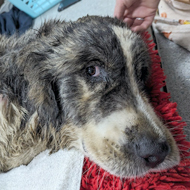The research focused on mountain gorillas living in and around the Bwindi Impenetrable National Park.
Study suggests current hygiene systems are effective
Students from the Royal Veterinary College (RVC) have carried out research to see if critically endangered mountain gorillas have contracted human diseases.
The research focused on mountain gorillas, cattle, goats and humans living in and around the Bwindi Impenetrable National Park (BINP), Uganda.
In 1993, gorillas in this region were habituated to humans to promote wildlife tourism and behavioural research. In turn, this led to gorillas venturing outside protected regions to forage.
The students identified an array of zoonotic pathogens, including low levels of Cryptosporidium parvum in gorilla and goats, and Giardia duodenal in humans and cattle.
While they did detect zoonotic pathogens, the students found no evidence for inter-species parasite transmission cycles. Their research also suggests that stringent hygiene policies, employed by those who interact with the gorillas, are currently effective.
“Expanding this work to assess the flow of bacterial and viral pathogens will be valuable, and help enhance welfare practices as well as hygiene policies employed by those who interact with animals in a professional capacity,” explained Professor Damer Blake, a parasite geneticist at the RVC.
“After fatal scabies outbreaks in mountain gorillas were traced to people living around BINP, we started to proactively prevent and control cross species disease transmission by improving the health of local communities and conducting such studies with RVC students,” added Dr Gladys Kalema-Zikusoka.
“We are pleased that this collaboration is enabling us to generate important information to protect this critically endangered species.”
The study, Molecular characterisation of protist parasites in human-habituated mountain gorillas (Gorilla beringei beringei), humans and livestock, from Bwindi Impenetrable National Park, Uganda, is published in Parasites & Vectors.
Image (C) Rod Waddington








